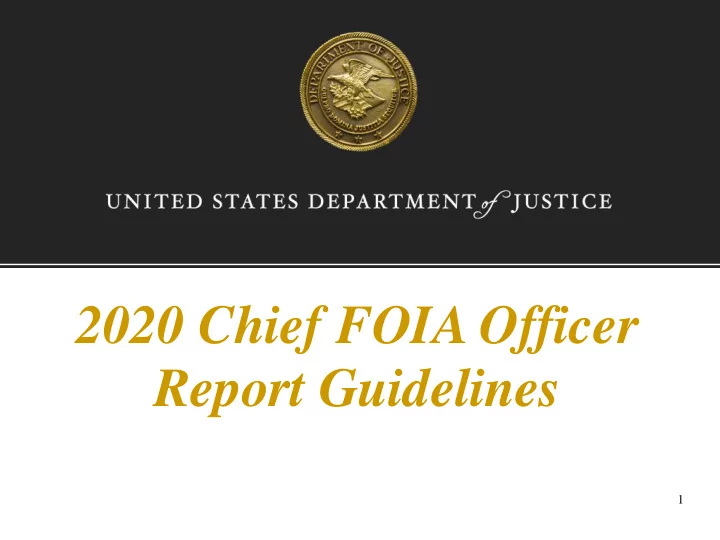

2020 Chief FOIA Officer Report Guidelines 1
Five Key Areas of FOIA Administration 1.Applying the Presumption of Openness 2.Ensuring that there are Effective Systems for Responding to Requests 3.Increasing Proactive Disclosures 4.Increasing the Utilization of Technology 5.Improving Timeliness and Reducing any Backlogs. 2
Reporting Requirements Agencies that received more than 50 requests in FY18 must provide their draft report responding to the questions in each of the five sections by January 17, 2020. Agencies receiving 50 or less requests in FY18 that choose to report should provide their report by February 14, 2010 . 3
OIP will hold a refresher training seminar on both the FY 2019 Annual FOIA Report and the 2020 Chief FOIA Officer Report. This year OIP plans to rollout a new Annual FOIA Report Tool that will improve both the process of producing the report and data quality. 4
New FOIA Supreme Court Case 5
Food Marketing Institute v. Argus Leader Media, 139 S. Ct. 915 (2019). The Supreme Court recently examined the definition of confidential under Exemption 4 and overturned the standard that was applied for over 40 years. 6
National Parks Test “Confidential” if release would: Impair the agency’s ability to 1. obtain similar information in the future; or 2. Likely cause substantial competitive harm to the person from whom the information was 7 obtained
Food Marketing Institute v. Argus Leader Media – Procedural Background The requester sought from USDA data reflecting individual retail stores’ aggregate annual dollar amount of Supplemental Nutrition Assistance Program (SNAP) benefits that the store redeems under the Program. 8
Food Marketing Institute v. Argus Leader Media – Procedural Background District court affirmed the protection of this data under Exemption 3 Eight Circuit reversed and remanded On remand, USDA withheld the information under Exemption 4 9
Food Marketing Institute v. Argus Leader Media – Procedural Background Applying National Parks , after a two-day bench trial the District Court found that Exemption 4 did not apply because any potential competitive harm was “speculative at best” USDA decides not to appeal 10
Food Marketing Institute v. Argus Leader Media – Procedural Background Food Marketing Institute (FMI) intervenes and appeals to the Eighth Circuit The Eighth Circuit affirms rejecting FMI’s contention that the court should look to the ordinary public meaning of the term “confidential” 11
Food Marketing Institute v. Argus Leader Media – Issue Before the Supreme Court How should the term “confidential” be defined when determining the applicability of Exemption 4? Is there any textual basis for the definition of “confidential” under National Parks in the FOIA? 12
Supreme Court Decision FOIA does not define the term confidential so must look to the term’s ordinary, contemporary common meaning when Congress enacted the FOIA in 1966. “The term confidential meant then, as it does now, ‘private’ or ‘secret.’” 13
Supreme Court Decision Contemporary dictionaries suggest two conditions that might be required: 1. Information remains confidential when “customarily kept private, or at least closely held, by the person imparting it.” 2. Information might be considered confidential only if the party receiving it provides some assurances it will be kept secret. 14
Supreme Court Decision – Condition 1 “At least the first condition has to be [met]; it is hard to see how information could be deemed confidential if its owner shares it freely.” 15
Supreme Court Decision – Condition 2 “But what about the second condition: Can privately held information lose its confidential character for purposes of Exemption 4 if it’s communicated to the government without assurances that the government will keep it secret?” The Court did not need resolve this question as this condition was also met in the case before it. 16
Supreme Court Decision – Definitive Standard for Defining Confidential “At least where commercial or financial information is both customarily and actually treated as private by its owner and provided to the government under an assurance of privacy, the information is ‘confidential’ within the meaning of Exemption 4 .” 17
Upcoming OIP Guidance on Exemption 4 OIP is currently formulating guidance that will provide workable rules for agencies to apply the new standard set by the Supreme Court. Agencies needing counsel on current requests and appeals can call OIP’s FOIA Counselor Line – 202-514-FOIA. Your case-specific examples and questions will help inform our guidance. 18
Recommend
More recommend